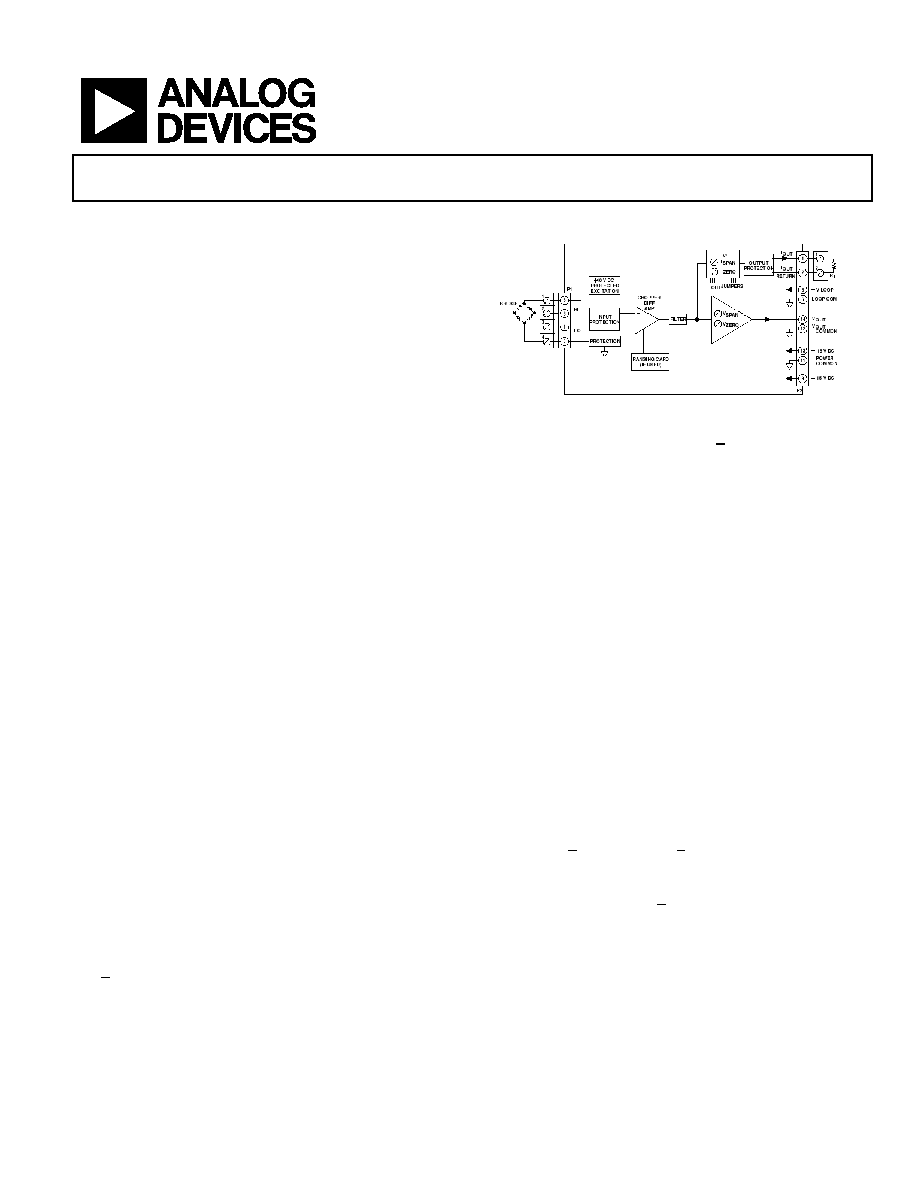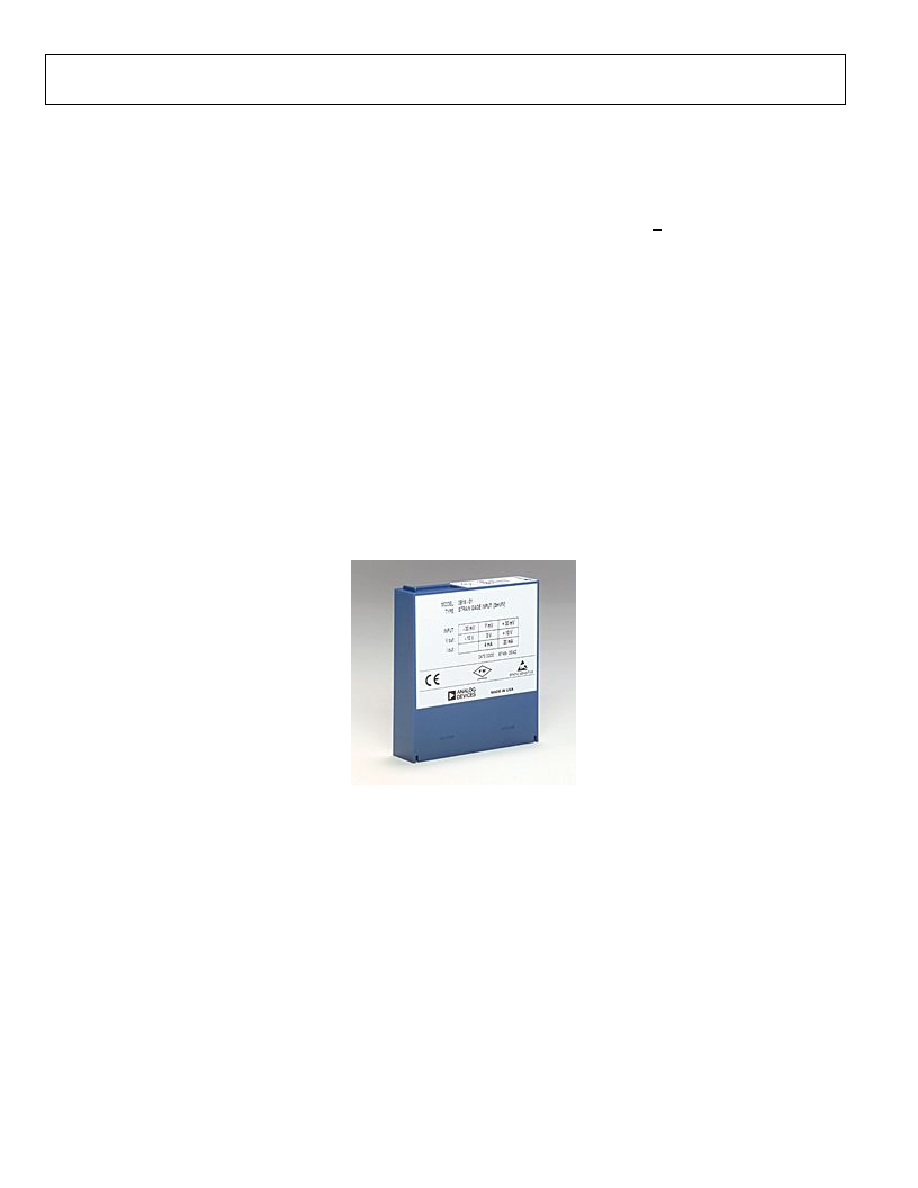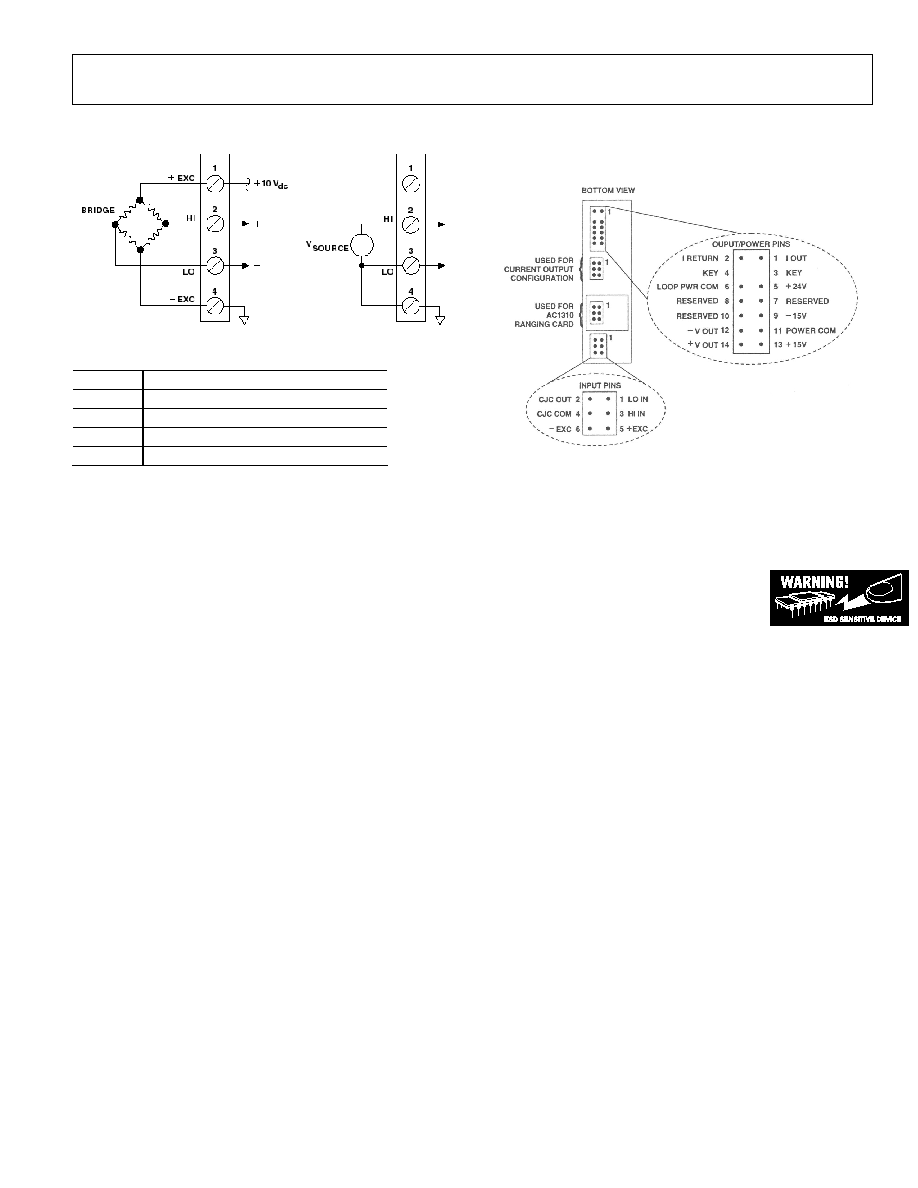 | –≠–ª–µ–∫—Ç—Ä–æ–Ω–Ω—ã–π –∫–æ–º–ø–æ–Ω–µ–Ω—Ç: 3B16 | –°–∫–∞—á–∞—Ç—å:  PDF PDF  ZIP ZIP |

Narrow Bandwidth Strain Gage Input
3B16
Rev. 0
Information furnished by Analog Devices is believed to be accurate and reliable.
However, no responsibility is assumed by Analog Devices for its use, nor for any
infringements of patents or other rights of third parties that may result from its use.
Specifications subject to change without notice. No license is granted by implication
or otherwise under any patent or patent rights of Analog Devices. Trademarks and
registered trademarks are the property of their respective companies.
One Technology Way, P.O. Box 9106, Norwood, MA 02062-9106, U.S.A.
Tel: 781.329.4700
www.analog.com
Fax: 781.326.8703
© 2004 Analog Devices, Inc. All rights reserved.
FEATURES
Interfaces, amplifies, & filters signals from 4-arm full-bridge
strain-gage bridges with a resistance from 300
to 1 k.
Module provides a constant +10V bridge excitation voltage.
Module provides simultaneous precision voltage and
current outputs.
Module circuitry can withstand 130v rms at the input screw-
terminals
All 3B16 series modules are mix-and-match and Hot
Swappable
APPLICATIONS
Industrial signal conditioning
Industrial signal isolation
Industrial signal filtering
PRODUCT OVERVIEW
The 3B Series of Signal Conditioning I/o Subsystems provide a
low-cost, versatile method of transferring analog transducer
signals to a data acquisition, monitoring or control system
without the inherent noise, non-linearity, drift and extraneous
voltages. The modules are designed to directly accept analog
signals from Thermocouples, RTD's, AC and DC Strain Gages,
Torque Transducers, Frequency Transducers, LVDTs, millivolt
or process current signals. The modules amplify, isolate,
linearize and convert the transducer output signals to
standardized analog inputs for high-level analog I/O
subsystems. The 3B Series Subsystem consists of a 10" relay
rack with universal mounting backplane and a family of plug-in
(up to 16 per rack) input and output signal conditioning
modules.
Eight and four channel backplanes are also available. Each
backplane incorporates screw terminals for sensor inputs and
current outputs and a 26-pin connector for high-level single-
ended voltage outputs to the user's equipment.
The input modules feature complete signal conditioning
circuitry optimized for specific sensors or analog signals and
provide two simultaneous high-level analog outputs: 0 to +10V
(or +10V) and 4-20 mA (or 0-20 mA).
FUNCTIONAL BLOCK DIAGRAM
Figure 1. 3B16 Functional Block Diagram
Output modules accept 0 to +10V (or +10V) single-ended
signals and provide an isolated 4-20 mA (or 0-20 mA) process
signal. All modules feature a universal pin-out and may be
readily hot-swapped under full power and interchanged without
disrupting field wiring.
The Analog Devices 3B Series Signal Conditioning Subsystem is
designed to easily handle signal conditioning problems in
measurement and control applications. Some typical uses are in
microcomputer-based data acquisition systems, programmable
controllers, analog recorders, dedicated control systems, and any
other applications where monitoring of temperature, pressure,
flow and analog signals are required. Since each input module
features two simultaneous outputs, the voltage output can be
used to provide an input to a microprocessor-based data
acquisition or control system while the current output can be
used for analog transmission, operator interface, or an analog
backup system.
Each input module is a single-channel signal conditioner which
plugs into a socket on the backplane and accepts its signal from
the input screw terminals. All input modules provide input
protection, amplification and filtering of the input signal,
accuracy of +0.1%, low drift of +1 uV/
o
C (low-level input
modules), and feature two high-level analog outputs that are
compatible with most process instrumentation. The isolated
input modules also provide +1500 V peak isolation.
The choice of a specific 3B module depends upon the type of
input signal. Input modules are available to accept millivolt, volt,
process current, thermocouple, RTD, AC and DC strain gage,
frequency and LVDT inputs. The voltage output of each module
is available from the system I/O connector while the current
output is available on the output screw terminals.

3B16
Rev. 0 | Page 2 of 8
GENERAL DESCRIPTION
The 3B16 is a single-channel signal conditioning module which
interfaces, amplifies, and filters signals from 4-arm full-bridge
strain-gage bridges with a resistance from 300W to 1kW. The
module provides a constant +10V bridge excitation voltage and
provides simultaneous precision voltage and current outputs.
The user-configurable Model 3B16-00 can be applied in
applications involving large tare weights which must be
compensated with zero suppression. The 3B16 protects the
computer side from damage due to field-side over-voltage faults
up to 130V rms. In addition, the current output withstands
130V rms without damage and interfaces user equipment
through screw terminals located on the 3B Series backplane.
The 3B16 is a plug-in, mix-and-match, hot-swappable module
which is easily field calibrated via front-panel zero and span
adjustments for both voltage and current outputs.
3B Series Custom-Ranging Program ≠ Externally-
programmable Model 3B16-00, enables the user to configure a
special input range, including tare weight suppression, by using
the optional plug-on AC1310 ranging card, which houses user-
supplied resistors to determine zero and span. To facilitate
selecting resistors, a Windows program, 3B-CUSTOM,
calculates resistor values based on the user-desired input/output
ranges.
A chopper-stabilized low-drift (+1uV/
o
C) input amplifier
assures long-term stability. At the amplifier input, a stable, zero-
scale input voltage is subtracted from the input signal to set the
zero-scale value. Zero suppression can exceed 100% of the input
range. This is ideal for expanded-scale applications requiring
high-resolution measurement of a selected portion of an input
signal. For user convenience, the zero and span can be factory
configured to meet custom range needs (Model 3B16-
CUSTOM) or can be externally programmed (Model 3B16-00)
via user supplied resistors inserted in the optional AC1310 plug-
on ranging card. Internal low-pass filtering with a 3 Hz cutoff
(-3dB) two-pole Butterworth filter enhances a 60 dB normal-
mode rejection at 50/60 Hz, enabling accurate measurement of
small signals in high electrical noise.
.
.
Figure 2

3B16
Rev. 0 | Page 3 of 8
3B16 Models Available
Model Input
Bridge
Input
Range
Excitation Sensitivity
Output
Ranges
1
3B16-00
Full Bridge
Externally
Programmable
2
+10 V
Externally
Programmable
2
-10 V to +10 V &
0 mA to 20 mA
3B16-01
Full Bridge
-30 mV to +30 mV
+10 V
3 mV/V
-10 V to +10 V &
0 mA to 20 mA
3B16-Custom
Full Bridge
*
+10 V
*
*
1
Output current range may be user programmed to 4 mA to 20 mA using jumper supplied.
2
Requires AC1310 ranging card.
* Custom Input/Output ranges are available. Refer to configuration guide.
3B16 Specifications
(typical @ +25∞C and ±15 V dc, and +24 V dc Power)
Description Model
3B16
Input Range
Standard Range
±30 mV (3 mV/V sensitivity @ V
exc
= +10V)
Custom Ranges
±5 mV to ±500 mV
Output Range
Voltage (R
L
> 2 K
)
-10 V to +10 V
Current (R
L
= 0 to 850
)
1
4 mA to 20 mA or 0 mA to 20 mA
Maximum Current Output Span
0 mA to 31 mA
Accuracy
2
Initial @ +25∞C
±0.1% Span
Nonlinearity
2
±0.01%
Span
Stability vs. Temperature
Voltage Output
Zero
±3 µV/∞C (RTI)
Span
±25 ppm of Reading/∞C
Current Output
3
Zero
±25 ppm of Span/∞C
Span
±25 ppm of Reading/∞C
Bridge Excitation
Voltage +10
V
Voltage, tolerance
±2%
Voltage vs. Temperature
±0.0015%/∞C
Bridge Resistance Range

3B16
Rev. 0 | Page 4 of 8
V
exc
= +10.0 V
300
to 1 k
Zero and Span Adjustment Range
4
±5% of Span
Input Bias Current
+3 nA
Input Resistance
100 M
Noise
Input, 0.1 Hz to 10 Hz Bandwidth
0.2 µV rms
Output, 100 kHz Bandwidth
50 µV rms
Bandwidth, -3 dB
3 Hz
Output Rise Time, 10% to 90% Span
200 ms
Common-Mode Voltage (CMV)
Input-to-Output, Continuous
±10 V peak, maximum
Transient ANSI/IEEE
C37.90.1-1989
Normal Mode Rejection @ 50/60 Hz
60 dB
Input Protection, Signal and Excitation Voltage
Continuous
130 V rms maximum
Trasient ANSI/IEEE
C37.90.1-1989
Voltage Output Protection
Continuous Short to Ground
Current Output Protection
130 V rms, continuous
Power Supply Voltages
5
±15 V dc Supplies
Rated Operation
±(12.7 V dc to 16.5 V dc)
Current
+45 mA, -10 mA
Sensitivity
±0.01% span/V
+24 V dc Loop Supply
Rated Operation
+12 V dc to +30 V dc
Current
+27 mA @ l
out
= 20 mA
Sensitivity
±0.0002% span/V
Mechanical Dimensions
3.15" x 3.395" x 0.775"
80.0 mm x 86.2 mm x 19.7 mm)
Environmental
Temperature Range
Rated Performance
-25∞C to +85∞C
Storage
-55∞C to +85∞C
Relative Humidity, 24 hours
0 to 95% @ +60∞C noncondensing
RFI Susceptibility
±0.5% Span error @ 400 MHz, 5 Watt, 3 ft
1
For a 0 mA to 20 mA range, a typical minimum output current is 10 µA.
2
Includes the combined effects of repeatability, hysteresis, and nonlinearity.
3
With respect to the voltage output.
4
A wide range of custom zero suppression and span is available with the 3B16-00 model, using the AC1310 ranging card.
5
+24 V dc loop power is required for driving the current output at loads up to 850
. If a current output load of 400
or less is applied, +15 V dc is sufficient for loop power. If only
voltage output is used, loop power is not required.
Specifications subject to change without notice.

3B16
Rev. 0 | Page 5 of 8
PIN CONFIGURATIONS AND FUNCTIONAL DESCRIPTIONS
Figure 3 3B16 Input Field Connections
Table 1. Pin Function Descriptions--
Pin No.
Description
1 +EXC
2 HI
3 LO
4 -EXC
Figure 4 . Model 3B Series Module, with pin-out assignments.
ESD CAUTION
ESD (electrostatic discharge) sensitive device. Electrostatic charges as high as 4000 V readily accumulate on the human
body and test equipment and can discharge without detection. Although this product features proprietary ESD
protection circuitry, permanent damage may occur on devices subjected to high energy electrostatic discharges.
Therefore, proper ESD precautions are recommended to avoid performance degradation or loss of functionality.




